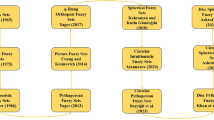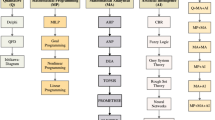Abstract
Multicriteria choice methods are developed by applying methods of criteria importance theory with uncertain information on criteria importance and with preferences varying along their scale. Formulas are given for computing importance coefficients and importance scale estimates that are “characteristic” representatives of the feasible set of these parameters. In the discrete case, an alternative with the highest probability of being optimal (for a uniform distribution of parameter value probabilities) can be used as the best one. It is shown how such alternatives can be found using the Monte Carlo method.
Similar content being viewed by others
References
V. V. Podinovskii, “Decision under multiple estimates for the importance coefficients of criteria and probabilities of values of uncertain factors in the aim function,” Autom. Remote Control 65 (11), 1817–1833 (2004).
V. V. Podinovski, “Conciliatory solutions of multicriteria choice problems,” Information Technologies in Science, Education, and Control: Proceedings of International Conference IT + S&E`16, Gurzuf, May 22–June 1, 2016, Ed. by E. L. Gloriozov (INIT, Moscow, 2016).
R. D. Dawes and B. Corrigat, “Linear models in decision making,” Psychol. Bull. 81, 95–106 (1974).
W. G. Stillwell, D. A. Seaver, and W. Edwards, “A comparison of weight approximation techniques in multiattribute utility decision-making,” Organizational Behav. Hum. Perform. 28, 62–77 (1981).
T. Solymosi and J. Dompi, “Method for determining the weights of criteria: The centralized weights,” Eur. J. Operat. Res. 26, 35–41 (1985).
F. J. Barron, “Selecting a best multiattribute alternative with partial information about attribute weights,” Acta Psychol. 80, 91–103 (1992).
W. Edwards and H. F. Barron, “SMARTS and SMARTER: Improved simple methods for multiattribute utility measurement,” Organizational Behav. Hum. Perform. 60, 306–325 (1994).
E. Roszkowska, “Rank ordering criteria weighting methods: A comparative overview,” Optimum: Stud. Ekon. 65 (5), 14–33 (2013).
M. Danielson and L. Ekenberg, “Using surrogate weights for handling preference strength in multi-criteria decisions,” in Outlooks and Insights on Group Decision and Negotiation, Ed. by B. Kamiński, G. Kersten, and T. Szapiro (Springer, New York, 2015), pp. 107–118.
F. H. Barron and B. E. Barrett, “Decision quality using ranked attribute weights,” Manage. Sci. 42, 1515–1523 (1996).
V. Belton and T. J. Stewart, Multiple Criteria Decision Analysis: An Integrated Approach (Kluwer, Boston, 2003).
V. V. Podinovski, “Parametric importance of criteria and intervals of value tradeoff uncertainty in the analysis of multicriteria problems,” Comput. Math. Math. Phys. 48 (11), 1979–1998 (2008).
V. V. Podinovski, Introduction to the Theory of Criteria Importance in Multicriteria Decision Making (Fizmatlit, Moscow, 2007) [in Russian].
V. V. Podinovski, M. A. Potapov, A. P. Nelyubin, and O. V. Podinovskaya, “Theory of criterion importance: State of the art and directions of further development,” The 12th All-Russia Conference on Control Problems VSPU-2014, Moscow 16–19 June, 2014 (Inst. Probl. Upr. Ross. Akad. Nauk, Moscow, 2014), pp. 7697–7702. http://vspu2014.ipu.ru/node/8581.
V. V. Podinovski, “Analysis of multicriteria choice problems by methods of the theory of criteria importance, based on computer systems of decision-making support,” J. Comput. Syst. Sci. Int. 47 (2), 221–225 (2008).
V. V. Podinovski and M. A. Potapov, “Theoretical foundations and systems of multicriteria decision-making support,” in Proceedings of the 34th International Conference on Information Technologies in Science, Education, Telecommunications, and Business, Gurzuf, Ukraine, May 20–30, 2007, Otkrytoe Obrazovanie, supplement, 87–89 (2007).
A. P. Nelyubin and V. V. Podinovski, “Relation between qualitative and quantitative criteria importance in multicriteria decision making problems,” Otkrytoe Obrazovanie, 89 (6),108–115 (2011).
P. C. Fishburn, Decision and Value Theory (Wiley, New York, 1964).
D. P. Kroese, T. Taimre, and Z. I. Botev, Handbook of Monte Carlo Methods (Wiley, New York, 2011).
Author information
Authors and Affiliations
Corresponding author
Additional information
Original Russian Text © A.P. Nelyubin, V.V. Podinovski, 2017, published in Zhurnal Vychislitel’noi Matematiki i Matematicheskoi Fiziki, 2017, Vol. 57, No. 9, pp. 1494–1502.
Rights and permissions
About this article
Cite this article
Nelyubin, A.P., Podinovski, V.V. Multicriteria choice based on criteria importance methods with uncertain preference information. Comput. Math. and Math. Phys. 57, 1475–1483 (2017). https://doi.org/10.1134/S0965542517090093
Received:
Accepted:
Published:
Issue Date:
DOI: https://doi.org/10.1134/S0965542517090093




